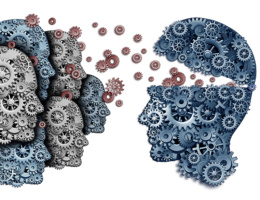Empathy- An Important Lesson for Kids

I think we should talk more about our empathy deficit – the ability to put ourselves in someone else’s shoes; to see the world through the eyes of those who are different from us – the child who’s hungry, the steelworker who’s been laid off, and the family who lost the entire life they built together when the storm came to town. When you think like this, when you choose to broaden your ambit of concern and empathise with the plight of others, whether they are close friends or distant strangers; it becomes harder not to act; harder not to help — Barrack Obama – 2006.
This resonates with the need of the hour in this generation. Empathy sets the basic blueprint of all relations whether social, economic, political, personal & professional. Empathy is understanding and putting oneself in the other person’s situation and trying to experience their feelings and reaction towards the given situation in life.
They say never criticise a person until you have walked in their shoes or lived their life. That’s the crux of showing empathy!
Kids need to be taught this very important life skill for the betterment of their life and society. People with great empathetic skills enjoy better socio-economic relations professionally and personally and greater well being.
You need to help kids express their thoughts and feelings about things and also express yours. Example;
“Neel did you shove Emily in the Park or was it by accident? Did you see how bitterly she was crying? If someone pushed you would you not cry?” Teach the kid if they did it on purpose or by accident they need to calm the other person down should learn to apologise and also not repeat the same or be very careful. No one is big or small and apologising and admitting one’s mistake is an admirable quality.
The child will express their feelings and ask them if there are things in class or at home they like or dislike. How are their friends, do they speak good or bad words (like slang or abusive language). Children are honest and you share your feelings about the negatives of bad or foul language.
Refrain from using anger to control your kids. Instead express why you think something is acceptable or not; this will enhance their thinking skills. Give them cues verbal and nonverbal, so they can perceive actions of sorrow, disagreement, happiness, hurt etc. Do role plays so they would understand actions and reactions to different situations.
If your partner is upset, check, ask them why! If they do not share then leave them for some time, they will cool down and get back to you. Your child will see that you are empathising and understanding the situation. Child will question, “Why daddy did not play today?” You could let the child know that daddy had a very long and hard day at office so he is a little tired and upset but once he gets fine he will play. You are indirectly empathising and teaching the kid empathy and also showing that giving time to the other person also is a way of helping and empathising with others.
Ask them if they would share their toys? Praise them and appreciate when they share their things with friends and are readily helping their friends
Involve them in charitable tasks. Let them know that their clothes and toys which they have outgrown are to be given away to the underprivileged kids who cannot afford them. Teach them empathy through giving and sharing.
 Involve them in daily household chores like setting the table, helping grandma with a glass of water, arranging the study table. Keeping things in place or putting them away in shelves this will teach them to help with task and empathy in doing things for someone who could do with extra help or being kind when you go to someone else’s house like helping granny or an aunt
Involve them in daily household chores like setting the table, helping grandma with a glass of water, arranging the study table. Keeping things in place or putting them away in shelves this will teach them to help with task and empathy in doing things for someone who could do with extra help or being kind when you go to someone else’s house like helping granny or an aunt
Teach them zero gender stereotyping; all work can be done by all. There are no girl or boy roles. Empathising involves equal opportunities being aware of others feelings and respecting them and not making fun. No labelling people girly or nerdy or geeks.
Teach them to accept differences in people and practicing inclusiveness as usual lead by example. Children see and learn.
Appreciate when they help someone with a chore or speak kindly with the elderly. Encourage them to speak their mind if they dislike something because empathy does not involve being blind in accepting things but also reasoning and understanding the other person’s reactions and actions. Children do not understand empathy till 8 or 9 years of age so when they are little we need to be the flag bearers of teaching them this skill as they need a catalyst who will introduce them to recognise their innermost feelings and those of others.
Showing sensitivity is a sign of power not weakness. Empathy is important in communication and in basic life skills that could help shape the future of the child and in turn the society.
When you show deep empathy toward others, their defensive energy goes down, and positive energy replaces it. That’s when you can get more creative in solving problems – Stephen Covey
A few books that you could read and they teach empathy to kids are listed below
- The Spiffiest Giraffe – Julia Donaldson
- The Sneetches – Dr. Seuss
- Stand In My Shoes – Bob Sornson
- Hey Little Ant – Philip M. Goose
- Red -A Crayon’s Story – Michael Hall
- The Invisible Boy – Trudy Ludwig
- Chrysanthemum – Kevin Henkes
- The Name Jar – Yangsook Choi
- A Sick Day for Amos McGee – Philip C. Stead
- Last Stop On Market Street – Matt De La Pena
- Tight Times – Barbara Shook Hazen
- How to Heal a Broken Wing – Bob Graham.
So do you plan to practise and propagate empathy with your kids? Let me know how…
Image Courtesy – http://kidswhocareaz.org/, Google
- Pooja Guha-Bansode
- August 3, 2017
- 0 Comment






